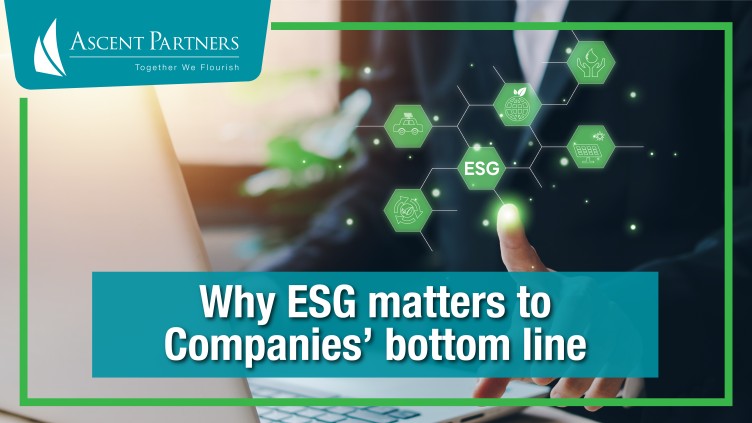
Ascent Partners welcomed Felix Lam from JPMorgan to discuss ESG and company bottom lines
At our most recent Breakfast Briefing, it was my pleasure to welcome Felix Lam, Asia ex-Japan, Head of Investment Stewardship at J.P. Morgan Asset Management on Thursday 25 May to discuss why Asset Managers are increasingly delving into the ESG credentials to make investment decisions.
Joined by 20 of our clients and guests, Felix and I discussed three major impacts that ESG has on a company’s bottom line, and how these need to be addressed by companies looking for external investment.
Why do investors care about the sustainability /ESG factors at companies?
The simple answer is that investors, and particularly Asset Managers, are under increasing pressure not only from their investors, but increasingly from global regulators.
This creates a duality of risk – not only can investors pull their money from the funds, but regulators can also impose fines and in very extreme cases, close a fund down.
As such, the risk factor is a major, if not defining factor, in investment allocation across the region. In Hong Kong, the onus to produce reliable and authenticated ESG strategies and reports is therefore on companies that are seeking investment. So companies need to spend time, money and effort into providing clear, accurate ESG assessments for the benefit of both investors and regulators.
What are some of the common ESG issues for listed companies in HK and Asia?
Firstly, Felix was keen to point out that it is not just this region that the most common ESG issues arise, but rather a global change in direction. The Asia Pacific region may be a little behind on regulation compared to the EU, but essentially many of the problems facing companies are global.
One of the key issues, Felix explained, is many of the companies in the Asia Pacific region are legacy companies, with founders still at the helm or only recently retired. With the incoming generation, the use of technology, new systems and practices are being implemented much faster than say 15 years ago.
This is an area that Felix was keen to stress – adopting new technologies and adapting to the changing regulatory environment is essential for companies to meet increasing pressures from investors and regulators.
Especially for smaller companies, measuring such items as Scope 3 emissions may seem daunting at first. But as technology rolls forward, data and expectations of compliance are becoming more and more affordable, effectively giving a company a clean ESG “Passport” so to speak.
How should companies prepare and react for changes?
To close the briefing, Felix and I discussed what companies need to do now, not tomorrow, not next year, to deal with these changes.
The greatest threat, in Felix’s opinion, is a breakdown in communication between all stakeholders. Companies, from the board level down, need to invest in ESG initiatives, training, and education of the staff.
Only by leading from the front can companies engage effectively with investors – it must be from board level down.
Getting buy-in across the company from an early stage will give a company a competitive advantage in the investment market. Constant communication with investors, a clear ESG strategic plan, and demonstrable results will lead to a favourable investment outlook.
Once again, on behalf of Ascent Partners, I would like to thank Felix Lam and all of our guests for a most interesting breakfast briefing, and I look forward to seeing you all again at the next event in June!
